 Petzlover
Petzlover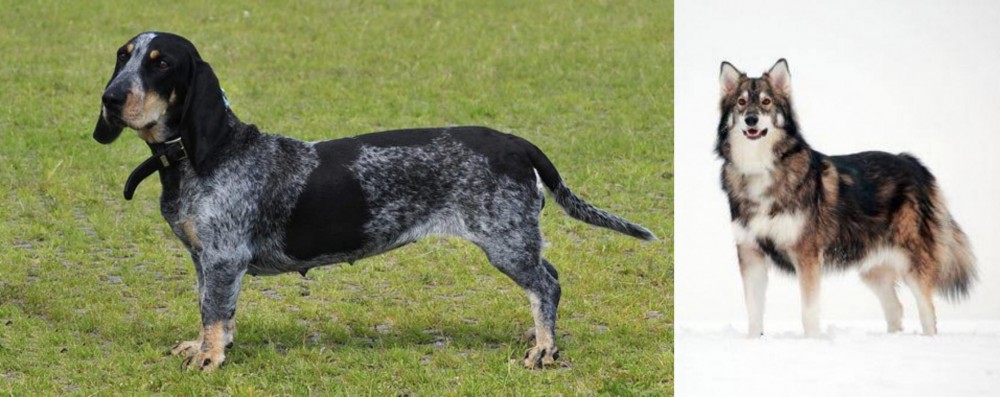 Basset Bleu de Gascogne is originated from France but Utonagan is originated from United Kingdom. Basset Bleu de Gascogne may grow 46 cm / 18 inches shorter than Utonagan. Basset Bleu de Gascogne may weigh 22 kg / 48 pounds lesser than Utonagan. Both Basset Bleu de Gascogne and Utonagan has almost same life span. Basset Bleu de Gascogne may have less litter size than Utonagan. Both Basset Bleu de Gascogne and Utonagan requires Moderate Maintenance.
Basset Bleu de Gascogne is originated from France but Utonagan is originated from United Kingdom. Basset Bleu de Gascogne may grow 46 cm / 18 inches shorter than Utonagan. Basset Bleu de Gascogne may weigh 22 kg / 48 pounds lesser than Utonagan. Both Basset Bleu de Gascogne and Utonagan has almost same life span. Basset Bleu de Gascogne may have less litter size than Utonagan. Both Basset Bleu de Gascogne and Utonagan requires Moderate Maintenance.
 The Basset Bleu de Gascogne is an old breed and also one of the most reserved of the Basset family. The Basset Bleu de Gascogne’s history can be traced back to the 14th century, originating in the region of Gascony, France. At one time there were very few of these dogs and Alain Bourbon began doing something about this in the early 20th century, although he didn’t document his breeding practices . There are theories though and one was that he bred a few of the very first Basset Bleu de Gascognes with the Basset Saintongeois and the Grand Bleu de Gascogne.
The Basset Bleu de Gascogne is an old breed and also one of the most reserved of the Basset family. The Basset Bleu de Gascogne’s history can be traced back to the 14th century, originating in the region of Gascony, France. At one time there were very few of these dogs and Alain Bourbon began doing something about this in the early 20th century, although he didn’t document his breeding practices . There are theories though and one was that he bred a few of the very first Basset Bleu de Gascognes with the Basset Saintongeois and the Grand Bleu de Gascogne.
Today the Basset Bleu de Gascogne is rarely found anywhere beyond France’s borders and there are only a few clubs for the Basset Bleu de Gascogne.
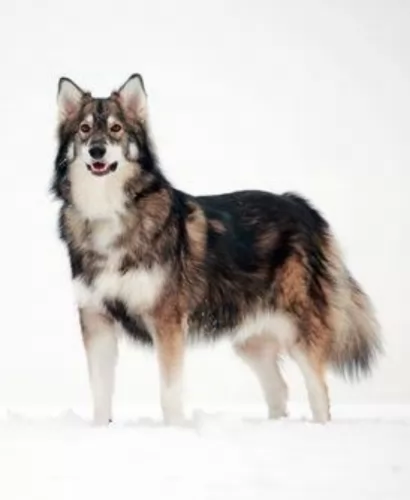 The Utonogan is such a wolf-like dog, you couldn’t be blamed for thinking you’d come face to face with a true wolf. They’re a rare dog breed that came about from crossing the Siberian Husky, the German Shepherd and the Alaskan Malamute.
The Utonogan is such a wolf-like dog, you couldn’t be blamed for thinking you’d come face to face with a true wolf. They’re a rare dog breed that came about from crossing the Siberian Husky, the German Shepherd and the Alaskan Malamute.
The dog was developed by Edwina Harrison and it was in the 1980s that the dog was introduced into the UK.
The Utonagan is a rare dog with only a few breeders. Take care with where you buy your Utonogan from and certainly steer clear of backyard breeders or puppy mills.
 The Basset Bleu de Gascogne today is a striking looking hound, and is the most reserved o the Basset breeds. When you look at him, their general appearance is large but not too heavy. Long of build, his height at the withers is about 30 – 38cm, and he weighs up to 18kg.
The Basset Bleu de Gascogne today is a striking looking hound, and is the most reserved o the Basset breeds. When you look at him, their general appearance is large but not too heavy. Long of build, his height at the withers is about 30 – 38cm, and he weighs up to 18kg.
He has short legs, thick bones, long floppy ears and dark brown, sad eyes, but is still agile and able to get around quickly. This particular Basset has a short, smooth, dense coat which is black with a white mottled pattern and some tan marking around the feet and face. You’ll most times notice black patches over his ears and sides of his head and there will typically be a white blaze on his skull.
The attractive Basset Bleu de Gascogne is one of 6 Basset Hound breeds, and this one is an energetic, lively dog who possesses a great sense of smell. Easy to train, he slots in well with his human family, wanting to please them all the time. They just love his dark, sorrowful brown eyes and the gentle expression on his face. With his deep bark, he tries to talk to his family. He is fairly easy to train, and with socialization and training he makes an exceptional pet.
Perhaps one aspect of the Basset family that doesn’t go down well with dog owners is their wandering nature. As a scenthound, he often gets the scent of something and wants to put his nose down and follow it. If you haven’t got a sturdy wall or fence around your property, he’ll just wander off.
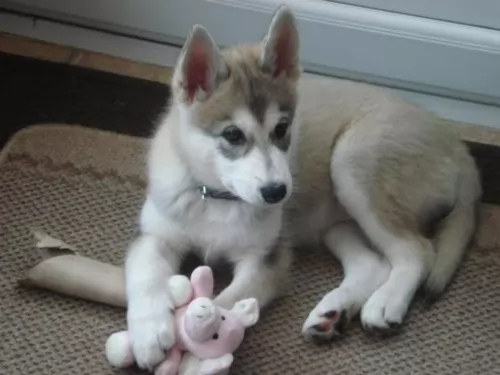 These dogs are large and lean, looking vibrant and strong. They stand at between 63-84 cm in height and weigh roughly between 32-40 kg.
These dogs are large and lean, looking vibrant and strong. They stand at between 63-84 cm in height and weigh roughly between 32-40 kg.
The body is long with strong but slender legs with webbed paws. They look like wolves with the sharp muzzle, the erect ears, bushy tails and slanted eyes with black eye rims. The double coat is thick and straight. Colors of the coat can be silver or gey, cream, brown, or black. The coat becomes thicker in the Winter.
The Utonagan is a very social dog, wanting to spend a lot of time with his human family. They have so many excellent qualities that make him a splendid pet - loving, loyal and gentle.
Whether you have other pets in the home or children, he is a dog that is able to get on with everyone. He is wary of strangers though and with training ad socialization he is going to be the most fantastic pet and companion.
 This smooth-coated breed with his low-set ears, his sad eyes, out-turned paws and gentle but intelligent pet make this dog an awesome, companionable pet. He is loyal, affectionate and devoted. They’re good with children and other pets, and can even make superb pets for older- or frail people who may lead a more sedentary lifestyle.
This smooth-coated breed with his low-set ears, his sad eyes, out-turned paws and gentle but intelligent pet make this dog an awesome, companionable pet. He is loyal, affectionate and devoted. They’re good with children and other pets, and can even make superb pets for older- or frail people who may lead a more sedentary lifestyle.
The Basset Bleu also sheds a bit less than their Basset Hound counterparts, although they do tend to shed throughout the year. He will require training, just like any dog really, but you don’t want to be harsh with training, as he is a gentle, sensitive dog.
Laid back, this dog which has always been an excellent hunter in days gone by, will make anyone a devoted, loyal friend.
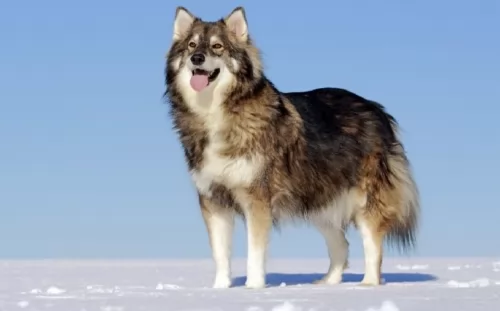 The Utonagan is an intelligent dog and also very social and people-oriented. He wants to be part of his human family, with a friendly, playful nature.
The Utonagan is an intelligent dog and also very social and people-oriented. He wants to be part of his human family, with a friendly, playful nature.
He will certainly not like being left alone and outside day after day. He can become frantic with frustration and this can be laid at the feet of an irresponsible dog owner.
Give him the life he wants and deserves, and this beautiful wolf-like dog will be your friend for life.
 A great aspect with Basset Bleus is that they have very few health issues and are quite laid back. They can easily get to 14 years of age and older with good nutrition and exercise. Nothing is set in stone however, and every breed can suddenly develop health problems.
A great aspect with Basset Bleus is that they have very few health issues and are quite laid back. They can easily get to 14 years of age and older with good nutrition and exercise. Nothing is set in stone however, and every breed can suddenly develop health problems.
Dogs like this with a deep chest can be prone to a condition known as gastric dilatation volvulus or bloat. This is a condition not to be taken lightly as it can be life threatening. Gastric dilatation volvulus means twisted stomach because of excessive gas or flatulence and your dog will require prompt treatment.
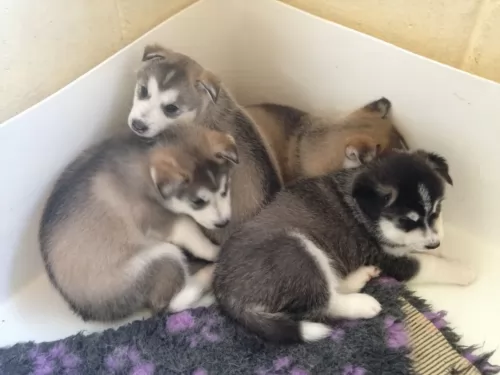 Yur Utonagans can live to be between 12 and 15 years of age, but a few issues can include cancer and joint dysplasia.
Yur Utonagans can live to be between 12 and 15 years of age, but a few issues can include cancer and joint dysplasia.
Cancer is a major cause of death in dogs old and young. There also seems to be some dog breeds that are more prone to cancer than others.
Thankfully most of the cancers are curable if you get them in the nick of time. The warning signs of cancer in your dog is much the same as with people and you’ll discover a new lump on your pet or a wound that simply won’t heal.
When you detect that your pet is lethargic and not acting his usual perky self, it is time to get him immediately to the vet.
 With his short coat, shedding isn’t a huge issue with the Basset Bleu. He sheds seasonally and then you will definitely have to brush him at least twice a week to get rid of all that loose hair.
With his short coat, shedding isn’t a huge issue with the Basset Bleu. He sheds seasonally and then you will definitely have to brush him at least twice a week to get rid of all that loose hair.
Some dog owners don’t get used to the slobbering of these dogs. Certainly, you will need to change his drinking water often because of this slobbering of his. It can result in the water containing viruses and bacteria which can cause infections in your dog.
These dogs tend to be lazy at home, so it will be up to you to see that he gets a good quota of exercise to prevent him becoming fat and prone to more illnesses. The backs, especially with added weight, can cause problems and this kind of dog shouldn’t be encouraged to jump off beds and couches.
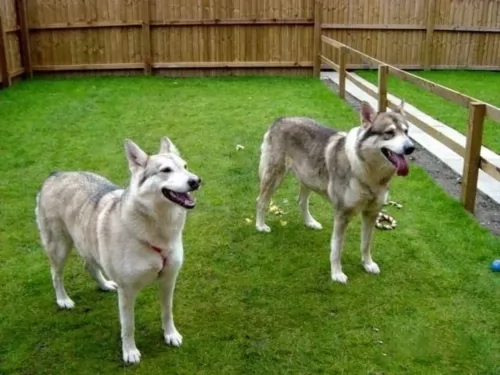 These are very high energy dogs and they will need exercise every day. While they will love a walk, they would be happier with something more vigorous such as a hike.
These are very high energy dogs and they will need exercise every day. While they will love a walk, they would be happier with something more vigorous such as a hike.
Swimming, ball games and hide and seek will all need to be on this dog’s menu of events. It is why it’s a dog that is better suited to life in the country as opposed to life in the city.
If you opt to buy this dog commercially manufactured food, he will need to have a high quality one high in vitamins and minerals and designed for energetic dogs. Try and avoid the inferior brands as they are packed with ingredients that can be of no value to your pet. There are ingredients which can actually make him sick.
Home-made food is always a good thing for dogs, especially when it is simple, nutritious food that won’t aggravate the stomach.
You can’t go wrong with foods such as boiled chicken, brown rice, and vegetables such as spinach, carrots and sweet potato. A little bit of raw meat added in occasionally can be excellent as well. Always make sure that a bowl of fresh water is available to your pet around the clock.
This is such a beautiful dog, you want to keep him that way. His thick coat is going to require regular brushing to keep it free from matting. Not only that, grooming stimulates the skin. You can also check him over at the same time for ticks and fleas and make sure there aren’t any unusual lumps on the body.
This type of dog values the grooming session as it is a bonding time for him, making him that much happier and content.
Other grooming needs will include taking care of his nails and checking inside his ears and mouth for signs of infection.